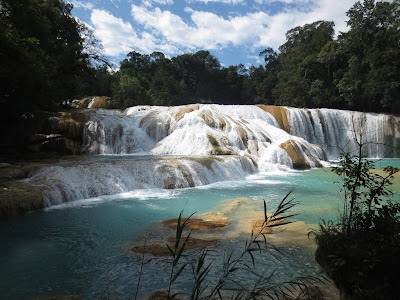(En camino hacia Palenque, y las Cascadas de Misolhá; las Cascadas de Agua Azul)
Cascadas Agua Azul, paisaje
extraordinario en selva de Chiapas:
Las
Cascadas de Agua Azul, ubicadas a 133 kilómetros de San Cristóbal de las Casas,
Chiapas, son uno de los paisajes de excelencia en esta entidad y forman parte
de los más conocidos del patrimonio natural de México.
Las aguas tiene ese hermoso color azul por las sales de
carbonatos que llevan disueltas. La vegetación es de tipo selva de montaña,
exuberante, en algunas partes cubre el río, es común ver troncos de árboles
caídos petrificados.
Desde lo alto se enriquece la combinación de colores
entre el de los animales y el de sus aguas, el blanco que resalta de sus
cascadas, donde turistas disfrutan la belleza acostados en la llanura o en las
piedras en las márgenes.
El río avanza
lentamente, parece un laberinto, se desliza en medio de una vegetación variada,
se perciben una diversidad de olores, incluso al amargo extraordinario del
follaje, testigo de las caídas y remansos que lo forman.
“Camino de San Cristóbal de las Casas
hacia Palenque, hacemos escala en Agua Azul, un conjunto de cascadas creadas
por las corrientes de los ríos Otulún, Shumuljá y Tulijá, formando cañones no
muy profundos con acantilados verticales, en donde se puede nadar y disfrutar
de las diferentes areas y servicios.
El presidente de la Federación Turística de
Chiapas (Fedetur), sostuvo que las Cascadas de Agua Azul son un gran atractivo
para el turismo mundial.
Chiapas, es una
entidad ubicada estratégicamente, cuenta con una oferta de 18 mil 600
habitaciones, donde lo que distingue a los prestadores de servicios es la
calidad. También informó que en los últimos años han visitado
territorio chiapaneco unos cuatro millones 200 mil turistas y gran parte de
éstos proceden de quienes pasean por Palenque.
El azul añil del
agua, el verde de la vegetación, la brisa constante y el sonido acuático
inagotable contribuyen a hacer de este lugar uno de los más espectaculares e
inolvidables de México.
El río Agua Azul desciende su lecho calizo en
escalones formando una serie de impresionantes cascadas que crean albercas
naturales contenidas por diques calcáreos, los llamados “gours” en la
terminología geológica. La carretera conduce al sitio donde se ubican los
modestos servicios con que cuenta.
Los intrépidos pueden alcanzar, con la ayuda de
guías locales, otras cascadas todavía más espectaculares, pues la escalera
continúa aguas abajo hasta que el río se precipita al Tulijá, formando una de
las más bellas cortinas de agua.
Su color se debe al lecho calizo, sólo
perceptible en épocas de seca; en la de lluvia la espectacularidad no disminuye
pues es cuando aumenta el volumen hídrico.
*Have you been to Agua Azul? (la linda experiencia de una familia con 5 niños, Blog: From Alaska to Argentina…)
The Most Beautiful Place We’ve Been So Far: Agua Azul, Chiapas, Mexico
We drove to Agua Azul, not thinking that
there might be an entrance fee. When we arrived at the gate, and saw the cost was $35 pesos each, we
became disheartened. We were about to turn around, when the gatekeeper
said, "Just pay us the $35 for one and we'll let you all in."
Gratefully
we accepted, and drove into the village complex that surrounded this massive
jewel-colored river with it's impressive series of resplendent waterfalls.
The parking lot was surrounded by restaurants and
artesian shops, with a police station on the other side. We parked under some
trees, and set up camp for the night, including hanging out our laundry to dry,
which we'd washed at a roadside waterfall.
After dinner, we took a stroll down to catch our first
glimpse of these famous falls, and for the kids to do a little swimming.
It was late in the day, and river was hidden in the
shadows of the forest of trees which surrounded it. Even then, the color was an
unearthly blue that was complimented by the roaring white that cascaded into it
from above. We were anticipating tomorrow, so we could explore the splendor in
the sunshine.
Agua
Azul is a series of cascades that descend alongside a path which has now been
built for tourists to walk on. It includes a lot of steps, as you hike up while
the water falls down, but the indescribable beauty that rewards you is worth
every effort (or as they say in Mexico, vale
la pena).
We wanted to hike up as far as we could go before we did
any swimming. The sign said that the 'boca' - mouth - of the
river lay 1 kilometer ahead. That was our aim.
As we climbed beside, the river on our right, we gawked
in awe at the myriad of falls - from giant, brilliantly white, roaring titans
to fairy sized, sparkling trickles - each delightfully winsome and with
jewel-like colors that you can only imagine or find in your dreams.
As
the pave path ends, and we leave the tourist area behind, we follow the jungle
trail that shadows the river's bends.
I found a boy fishing with a bit of string; a canoe and
it's two boatmen lazily floating down the river; a village on the opposite
bank; and two men working in a banana field.
The
path stopped at a beach that gradually sloped into the transparent, blue
waters. From the waters edge, you could look up toward the cliffs, where water
gushed forth out of the rocks.
A private beach on an breathtaking river in the middle of the Mexican jungle, what more could you ask for?
The kids swam and dug and played to their hearts content.
Greg and I just looked around in amazement at the incomparable beauty that
surrounded us. Wow!






















